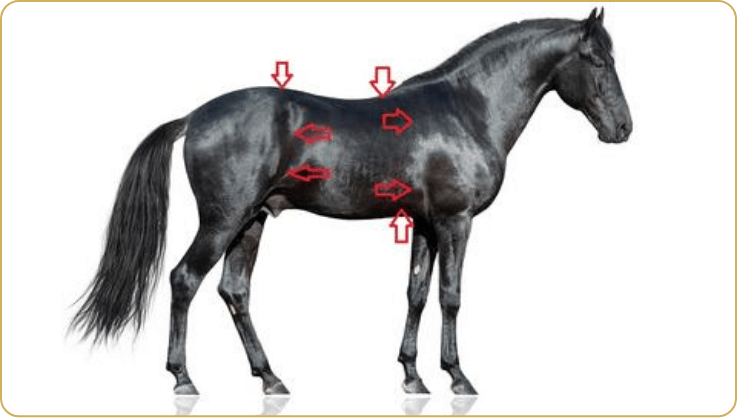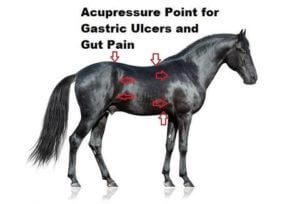Gastric Ulcers in Horses
Gastric, or stomach ulcers are sores that occur in the horse’s foregut and result from a break or erosion in the lining of the esophagus, stomach, or small intestine.
Hindgut ulcers, specifically in the colon, are called colonic ulcers. Colonic ulcers are particularly challenging to diagnose and usually require an ultrasound for their detection. The severity of the condition is measured by the thickness of the colon’s outer wall.
Additionally, high-stress environments such as intense training or competition can increase the likelihood of ulcer formation due to heightened cortisol levels and reduced blood flow to the stomach lining.
They are common in horses and can affect any horse at any age but occur most frequently in horses that perform athletic activities or live a stressful life.
Ulzeraide Plus – Nutritional Supplement
If you are looking for a nutritional supplement that can help prevent gastric ulcers and aid in recovery, Ulzeraide Plus is a winning formula. This can be used with veterinary treatment, (omeprazole) or after a course.
Acupuncture points for Horses with Ulcers and Gut Pain
”When light pressure is applied to the acupuncture points marked in red, the horse will twitch, bite, kick, pull faces, or drop back. This can indicate gastric ulcers, grass-related problems, incorrect feeding, or a badly fitting saddle”.
From an equine therapist’s point of view, often after treatment, these points are still sore or the pain comes back. This can be due to gastric ulcers. Usually, the horse is sore on the right hind, may step short, or have an odd gait. Curves to the left and pushes out through the right rib cage.
The Hindgut is on the right-hand side
When there is pain due to gut pain and ulcers, the horse shows these symptoms and is very hard to straighten up with massage therapy. In the past Rachel scratched her head and wondered what was wrong, she did not understand why the horse did not get better with Equine Therapy alone.
The horse’s hindgut, or large intestine, consisting of the cecum and colon is integral to the overall functioning of the horse’s digestive system. It also has a significant role in fostering bacterial content. Feed breakdown and fermentation by bacteria in the hindgut are vital processes.
Fermentation is the process of chemically breaking down substances by bacteria, yeast, or other microorganisms, providing the horse with energy, vitamins, minerals, and amino acids.
A deficiency in proper fermentation can lead to various adverse effects including poor feed utilisation, reduced appetite, dehydration, compromised coat, and hoof condition, decreased immune function, and altered behavior, ultimately leading to degraded performance and training.
Typical Symptoms Of Gastric Ulcers:
- Poor athletic performance.
- Wind sucking.
- Poor appetite.
- Sensitive around girth region and adverse to grooming.
- Soreness over last rib and flank region, especially the right side.
- Dropping through withers when pressure is applied on top of vertebrae, even though saddle fits.
- Reluctant eating hay.
- Reluctant to hold vertebrae adjustments and is muscle sore for no apparent reason.
- Pain in the wither region is often a saddle fitting issue, but when the professional saddle fitter comes out numerous times and can’t find a problem with the saddle
- Horse is sore on the right hind, may step short or have an odd gait.
- Recurrent colic episodes.
- Weight loss.
- Behavioral changes.
- Frequent pawing at the ground.
- Teeth grinding, or biting at their sides.

Acupuncture points for Horses with Ulcers and Gut Pain. When light pressure is applied to the acupuncture points marked in red, the horse will twitch, bite, kick, pull faces, or drop back. This can indicate gastric ulcers, grass-related problems, incorrect feeding, or a badly fitting saddle. Ulzeraide Plus is a great nutritional supplement to help prevent and aid in recovering gastric and stomach ulcers.
Some Causes Of Gastric Ulcers: Gastric ulcers in horses are primarily caused by the modern lifestyle they lead.
- Long periods of time without food.
- High grain diet.
- High starch diets: Feeding horses with high-starch diets fuels the production of additional gastric acid, which may lead towards development of ulcers.
- Stress.
- The use of non-steroidal anti-inflammatory drugs (NSAIDs) should be carefully managed, as prolonged use of these drugs can increase the risk of ulcer formation. If NSAIDs are necessary for the horse's health, they should be used under the guidance of a veterinarian, and the horse's gastrointestinal health should be closely monitored.
- Environmental pollution and pesticides.
- Bad fitting saddle and the stress this causes.
- Inadequate turnout time.
- Lack of social interaction.
- Intensive training: Overtraining can stress horses, leading to an increase in stomach acid production and decreased blood flow to the stomach lining.
- Confinement: Horses are creatures of free movement. Being confined for long periods can create a disruptive environment for their digestive system.
- High levels of pain.
- Loss of a companion.
- Stabling for long periods of time due to injury.
- Fence walking and running.
- A horse that does not get enough food or hay - they need food going through the stomach to soak up the gastric juices.
Prevention Of Gastric Ulcers:
- Manage stress.
- Avoid your horse travelling on an empty stomach.
- Avoid fence walking.
- If your horse is on a restricted pasture diet, make sure they have hay to eat at all times.
- Avoid or decrease the use of anti-inflammatory drugs.
- Feeding smaller meals more frequently throughout the day.
- One of the key measures is to ensure that the horse has regular access to forage. Horses are natural grazers and their digestive systems are designed to have a constant flow of food. Therefore, providing them with continuous access to high-quality hay or pasture can help buffer stomach acid and prevent the formation of ulcers.
- Feed Ulzeraide Plus daily for prevention.


